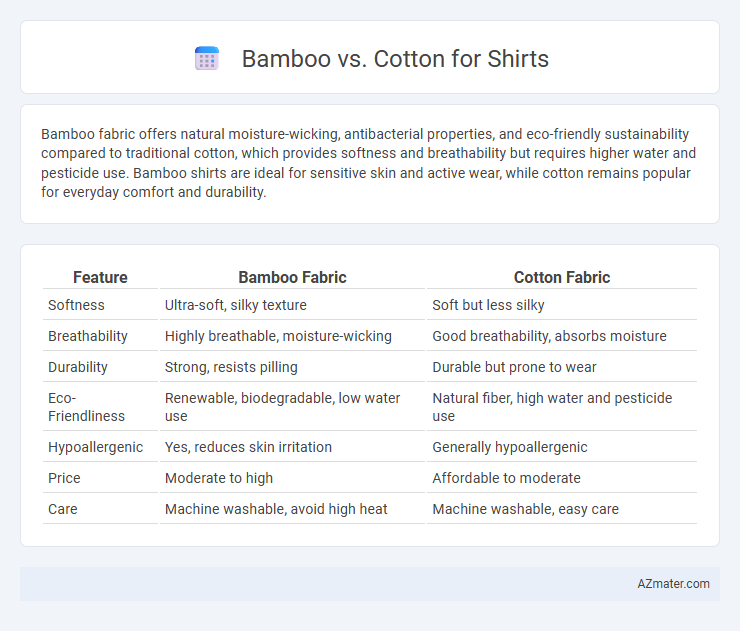Bamboo fabric offers natural moisture-wicking, antibacterial properties, and eco-friendly sustainability compared to traditional cotton, which provides softness and breathability but requires higher water and pesticide use. Bamboo shirts are ideal for sensitive skin and active wear, while cotton remains popular for everyday comfort and durability.
Table of Comparison
| Feature | Bamboo Fabric | Cotton Fabric |
|---|---|---|
| Softness | Ultra-soft, silky texture | Soft but less silky |
| Breathability | Highly breathable, moisture-wicking | Good breathability, absorbs moisture |
| Durability | Strong, resists pilling | Durable but prone to wear |
| Eco-Friendliness | Renewable, biodegradable, low water use | Natural fiber, high water and pesticide use |
| Hypoallergenic | Yes, reduces skin irritation | Generally hypoallergenic |
| Price | Moderate to high | Affordable to moderate |
| Care | Machine washable, avoid high heat | Machine washable, easy care |
Introduction to Bamboo and Cotton Shirts
Bamboo shirts boast natural antibacterial properties, moisture-wicking abilities, and eco-friendly cultivation with minimal pesticides, making them an increasingly popular sustainable fabric choice. Cotton shirts, known for their breathability and softness, have been a wardrobe staple for centuries, but conventional cotton farming often requires significant water and chemical usage. Choosing between bamboo and cotton shirts depends on preferences for environmental impact, comfort, and durability in everyday wear.
Environmental Impact: Bamboo vs Cotton
Bamboo shirts have a lower environmental impact due to bamboo's rapid growth and minimal need for pesticides or fertilizers, which reduces soil depletion and water usage compared to cotton. Cotton cultivation requires significant water resources and heavy pesticide application, leading to soil degradation and pollution. Bamboo's natural biodegradability and carbon sequestration contribute to a more sustainable and eco-friendly fabric choice for shirts.
Comfort and Softness Comparison
Bamboo fabric offers exceptional softness and breathability compared to cotton, making it ideal for sensitive skin and hot climates. Its moisture-wicking properties keep the wearer dry and comfortable longer than traditional cotton shirts. While cotton provides a classic feel and durability, bamboo's hypoallergenic and thermo-regulating qualities enhance overall comfort and softness in everyday wear.
Breathability and Moisture-Wicking Properties
Bamboo fabric offers superior breathability compared to cotton due to its micro-gaps and micro-holes that enhance airflow, making it ideal for temperature regulation in shirts. Its natural moisture-wicking properties efficiently draw sweat away from the skin, keeping wearers dry and comfortable during physical activity. Cotton, while breathable, tends to retain moisture longer, which can lead to a heavier, damp feel in shirts under intense heat or sweat conditions.
Durability and Longevity
Bamboo fabric is known for its high durability, resisting wear and tear better than many natural fibers, which contributes to longer-lasting shirts. Cotton shirts provide comfort and breathability, but they tend to wear out faster due to frequent washing and fabric stress. Bamboo's natural antibacterial properties and moisture-wicking ability also help maintain fabric integrity over time, making it a superior choice for durable, long-lasting apparel.
Skin Sensitivity and Hypoallergenic Qualities
Bamboo fabric offers superior skin sensitivity benefits compared to cotton, as its natural antimicrobial and hypoallergenic properties reduce irritation and allergic reactions. Cotton, while breathable and soft, may retain allergens like dust mites and requires chemical treatments that can sometimes cause skin sensitivity. Choosing bamboo shirts promotes healthier skin, especially for individuals with sensitive or allergy-prone skin.
Maintenance and Care Requirements
Bamboo shirts require gentle washing with mild detergents and avoid high heat drying to maintain their softness and durability, whereas cotton shirts are more resilient to frequent machine washing and can withstand higher drying temperatures. Bamboo fabric's natural antibacterial properties reduce odor retention, allowing less frequent washing compared to cotton, which often needs regular laundering to prevent bacteria buildup. Proper maintenance of bamboo involves air drying or low heat, while cotton shirts respond well to tumble drying and ironing at higher temperatures.
Cost and Affordability Factors
Bamboo shirts generally cost more than cotton shirts due to the sustainable production processes and natural antibacterial properties of bamboo fibers. Cotton shirts tend to be more affordable and widely available, benefiting from established manufacturing infrastructure and economies of scale. Cost considerations should weigh the higher price of bamboo against its durability and eco-friendly benefits compared to the budget-friendly and breathable nature of cotton.
Style and Color Retention
Bamboo fabric offers superior color retention compared to cotton, maintaining vibrant hues even after multiple washes due to its natural fibers' ability to hold dyes effectively. Shirts made from bamboo often exhibit a softer, smoother texture that enhances drape and lends a luxurious style appeal. Cotton shirts may fade faster and show wear over time, impacting the garment's overall aesthetic and style longevity.
Which is Better: Bamboo or Cotton Shirts?
Bamboo shirts offer superior moisture-wicking properties and natural antibacterial qualities, making them ideal for active wear and sensitive skin. Cotton shirts provide breathability and durability, with variations like Pima cotton ensuring softness and long-lasting comfort. Choosing between bamboo and cotton shirts depends on preferences for sustainability, feel, and performance, with bamboo excelling in eco-friendliness and moisture management, while cotton remains a versatile and widely favored fabric.

Infographic: Bamboo vs Cotton for Shirt
 azmater.com
azmater.com